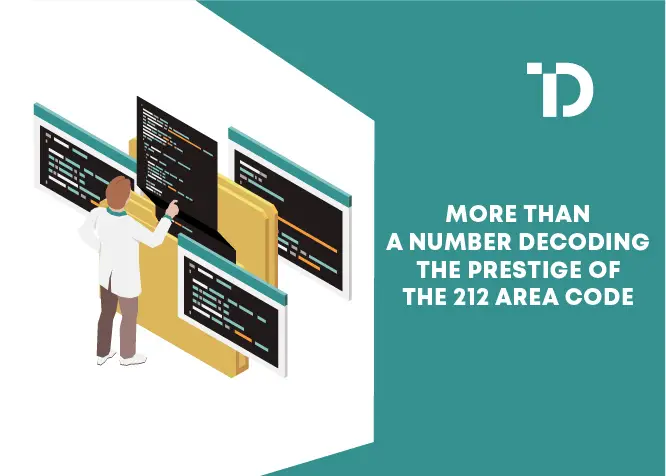As indicators of geographical regions, area codes were once mere technical necessities in telecommunication systems. Over time, however, specific area codes have garnered a status that transcends their functional purpose. Today, owning a 212 phone number for sale isn’t just about having a point of contact; it’s about owning a piece of history, a signal of stature in a vast digital landscape where your number can say much more about you than just where you are.
The Legacy of the 212 Area Code
As the first area code specifically assigned to New York City, 212 came to represent not only geographical location but also status and history. The convergence of this area code’s financial, entertainment and cultural districts only exacerbated its desirability. Celebrities, influential businesses, and institutions have long coveted this marker of Manhattan roots. The rise to prestige of the 212 area code is steeped in this rich tapestry of history and status, representing a nexus of influence and power. Are you intrigued by the power of a 212 number for your brand? Look no further! With the variety of 212 phone number for sale, you can find the perfect fit to elevate your brand image and connect with your target audience in a whole new way. Imagine how a memorable 212 number can impact your marketing materials, business cards, and online presence. Stand out from the crowd and establish your brand’s presence in the heart of New York City’s legacy.
Area Codes and Their Impact on Modern Business
In business, an area code can serve as a first impression, a silent spokesperson of a company’s brand. A coveted area code such as 212 can signify to clients an established presence in the heart of the business world. Whether creating a sense of locality for a national brand or projecting an international image for local startups, the choice of area code can play a subtle yet integral role in business strategy and marketing. Companies deliberately seeking out these prestigious digits find that their communicative value can sometimes outweigh their operational utility.
Technological Changes and Area Code Relevance
With the advent of VOIP and mobile technology, the area code’s original purpose – dictating a call’s geographic origin – has diminished. Nowadays, owning a number from the other side of the country, or even the world, is possible without geographic ties. However, area codes like 212 still carry a traditional merit. They resonate with cultural lore; they imply longevity, legacy, and a sense of heritage in the fast-paced digital age where new is often equated with better.
Personal Branding and Area Codes
The correct area code can be a differentiator in an economy where networking and personal branding have become crucial. A 212 number on a business card might convey a long-standing involvement in New York City’s bustling business life. For professionals wishing to associate themselves with the dynamism and success synonymous with NYC, a 212 number can enhance their brand narrative, adding a layer of prestige that modern-day vanity numbers can’t consistently reproduce. Personal branding extends beyond mere appearance; the correct area code can be a powerful component of that visual identity.
The Psychological Influence of Area Codes
People’s perception of different area codes carries significant weight. A prestigious area code can change the dynamics of a conversation before the first word is spoken. Inherent social psychology is at play; these numbers evoke achievement, reliability, and stature associations. Studies have shown that individuals can ascribe personality traits and business acumen based solely on contact information – a testament to their psychological influence and the silent power they wield in personal and business relationships.
The Future of Area Codes in Communication
The narrative around area codes is still ongoing. Speculation abounds as to whether this trend towards prestigious area codes will continue to hold sway in our globalized digital communication networks. What role will geographic-based numbers play in a future saturated with instant messaging apps, global reach, and ever-evolving digital identities? While technology progresses, the emotional attachment to specific numbers seems impervious to change, suggesting that area codes like 212 will retain their allure for the foreseeable future.
How to Obtain a Coveted Area Code
Procuring a 212 area code can be akin to chasing a piece of history, but it’s far from impossible. From private brokers to specialized telecom companies offering area codes with storied pasts, the marketplace for prestigious numbers is alive and well. As detailed in The Atlantic, the demand for such area codes is driven by the cachet that comes with them – for some, it’s well worth the investment. Despite this, one must navigate this marketplace sharply, ensuring that ethical practices and authenticity are at the forefront of such acquisitions.
The Global Perspective on Area Code Status
Internationally, the desire for distinctive area codes mirrors the pattern set by the 212 phenomenon. Major cities around the globe have their versions of sought-after area codes, each carrying a connotation of business, culture, or history. They stand as status symbols, gateways to elite networks, and symbolic of the cities they represent. This parallel across continents underscores the universal human propensity to find meaning and prestige in the numbers we use to connect.
Conclusion
The prestige of the 212 area code is more than just area code allocation; it’s about history, identity, and the intersection of communication and perception. As we continue to witness the digitization of communication, numbers like 212 still hold a coveted spot in the collective consciousness, representing an era of communication that has shaped and will continue to shape social and business constructs. Whether seen as anachronistic or endearingly rooted in tradition, the resonance of 212 is undeniable. For more insights on the evolution of communication, consider the perspectives from Wired, which takes a closer look at the future of communication technology and how it may continue to redefine the way we value and utilize our digital identifiers.
